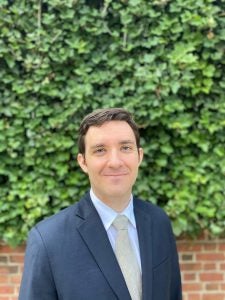Georgetown Law Welcomes Nine New Faculty Members
August 26, 2022
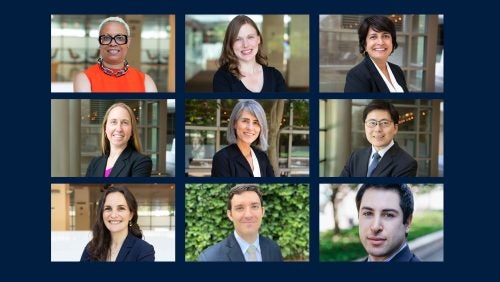
The nine newest faculty members at Georgetown Law: Dorothy Brown, Kathleen Claussen, Anupama Chaturvedi Connor, Sara Kaiser Creighton, Amy Griffin, Mark Jia, Nicole Summers, Daniel Wilf-Townsend and Jonathon Zytnick
At the start of the 2022-3 academic year, we are pleased to introduce the newest members of our faculty.
Eight distinguished professors joined us this summer and one more will be with us beginning in the second semester. Collectively, they bring deep experience in taxation, international economic law, comparative law, housing policy, legal writing, corporations, consumer protection and much more.
“These accomplished teachers and scholars will strengthen and enrich our community. I look forward to working with all of them for years to come,” said Dean William M. Treanor. He also noted with pride that three of them are Georgetown Law graduates.
Learn more about our new professors below:
Professor Dorothy Brown (L’83), Martin D. Ginsburg Chair in Taxation
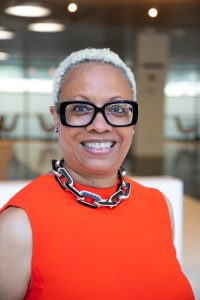 As a child, Dorothy Brown (L’83) idolized Thurgood Marshall, the nation’s first Black Supreme Court justice. Originally she wanted to be a civil rights lawyer just like him, but growing up in the South Bronx, where racism was an everyday struggle, she decided she wanted a career that would focus on something that had nothing to do with race.
As a child, Dorothy Brown (L’83) idolized Thurgood Marshall, the nation’s first Black Supreme Court justice. Originally she wanted to be a civil rights lawyer just like him, but growing up in the South Bronx, where racism was an everyday struggle, she decided she wanted a career that would focus on something that had nothing to do with race.
“So I picked tax law, or perhaps tax law picked me.” she says.
She came to Georgetown Law after college at Fordham in large part because it had a significant number of Black students, then earned an LL.M in Taxation at New York University School of Law.
Over the next several years, she clerked for a tax court judge, went into private practice, worked as an investment banker and served as a political appointee in the Department of Housing and Urban Development. Finally, she decided to give academia a try.
“I thought I would like the teaching aspect and I wouldn’t like the writing aspect. And as it turned out, I like the teaching, but I really like the writing,” she says.
Brown’s acclaimed 2021 book, “The Whiteness of Wealth: How the Tax System Impoverishes Black Americans – and How We Can Fix It,” chronicles how after going into academia, she began to realize that tax policy, the specialty she’d chosen to take her far away from the racism and inequality of her childhood, in fact very much had to do with such things. For generations, our nation’s tax code has benefited the wealthy and white and disadvantaged the poor and Black.
“In the end, I became the civil rights lawyer I dreamed of becoming as a child,” she says.
Brown’s teaching and scholarship focus on the intersection of tax law and civil rights. She was most recently the Asa Griggs Candler Professor of Law at Emory and previously taught law at Washington and Lee, the University of Cincinnati and George Mason.
She’s not teaching this semester in order to focus on writing projects, including an updated edition of her case book on critical race theory and a new book on reparations. But she’s looking forward to returning to the classroom this spring after visiting at Georgetown Law last fall.
“Georgetown students are at the top of their game and ask incredibly insightful questions. They’re very interested in policy solutions,” she says – which interest her as well. For example, she’s hoping to have more opportunities like the one she had in June to testify on Capitol Hill at a U.S. House Select Committee on Economic Disparity and Fairness in Growth hearing on tax policy.
“At this point in my career, I want to make change, and you make change by working with policy makers,” she says. “So being in D.C. and coming home to Georgetown is a big plus for me.”
Professor Kathleen Claussen
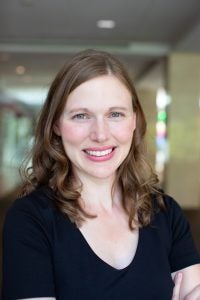
Throughout her years growing up in Kansas, Kathleen Claussen always wanted to become a teacher, and always wanted to see the world. During high school, and then college in Indiana, she traveled overseas frequently for study and work.
She studied Spanish in Spain, public administration in Mexico and international law in Denmark. She worked at the European Parliament in Brussels and interned at the International Criminal Court in The Hague. After graduating from Indiana University, she earned a master’s degree in International Politics & Ethnic Conflict at Queen’s University Belfast as a George J. Mitchell Scholar.
When she began at Yale Law School, she knew she was interested in a career that included public service and teaching international law. The only question was: what area of international law?
“I thought it was going to be human rights and international criminal law. But I took a class in international economic law and decided that was the right fit,” she recalls.
After law school, she clerked for Judge David F. Hamilton of the United States Court of Appeals for the Seventh Circuit, then headed back overseas.
A one-year fellowship at the Permanent Court of Arbitration in The Hague turned into two more years as legal counsel to the arbitrators, handling disputes over a variety of matters from natural resources to commercial contracts.
Next, Claussen joined the Office of the United States Trade Representative, where her portfolio included labor, investment, national security and agricultural cases. She enjoyed the work, but after three years decided it was the right time for her long-planned move into academia.
She began her teaching career at the University of Miami School of Law five years ago and spent parts of the last two years as a visiting professor at Washington & Lee and then at Northwestern Pritzker School of Law. She will join the Georgetown Law faculty in January 2023.
Claussen already has several ties here: she is a Non-Resident Senior Fellow at the Institute of International Economic Law (IIEL) and is co-Editor-in-Chief of the Journal of International Economic Law, which, like IIEL, was founded by a past giant of the Georgetown Law faculty, John H. Jackson.
She is already making plans for initiatives that she will lead at Georgetown Law over the coming years: a meeting next year of an organization she founded, The Consortium for the Study and Analysis of International Law Scholarship (SAILS); then the following year and beyond an annual colloquium that will bring international law and foreign relations experts to campus.
“Georgetown has one of the best, if not the best, international law faculties in the world,” says Claussen. “I’m excited to learn from my new colleagues, and to work with so many terrific students who are drawn to this area because of Georgetown’s strengths.”
Associate Professor Anupama Chaturvedi Connor (L’02)
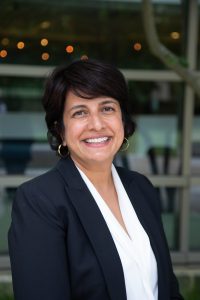 Anupama Chaturvedi Connor (L’02) has law in her blood, she says.
Anupama Chaturvedi Connor (L’02) has law in her blood, she says.
Her great-grandfather was a judge in India, and her grandfather became a lawyer during the movement for Indian independence – and was even imprisoned for his work. One of her uncles was also a lawyer and her older sister graduated from Georgetown Law.
So after graduating from Cornell University, Connor followed in all these forebears’ footsteps and enrolled at Georgetown Law herself.
“My sister had such a good experience here, and she had such good friends,” Connor says. She was excited about experiencing a larger city after living in upstate New York her entire life to date. While a student here, Connor was in the Criminal Justice Clinic and was a Law Fellow. She also met the man who became her husband. “It was all meant to be!” she says.
Since law school, she and her husband have been living out a pattern that will be familiar to many two-lawyer couples. She joined a firm to start paying down her student loans and their mortgage, then he took a job as an Assistant U.S. Attorney. When they started having children, he went into private practice and she later took a political position at the Consumer Product Safety Commission. Next, she worked on the management side at Potomac Law Group, a “new model” virtual firm founded by Georgetown Law alumnus Benjamin Lieber (L’95) that gives its lawyers the opportunity to work flexible schedules.
“I needed to be able to work from home,” she says of joining the firm shortly after her third child was born. “I worked with them for many years and it was great, because the firm grew as my daughters grew.”
All along the way, Connor stayed in touch with her Georgetown Law professors, interested in making a move into academia. They let her know whenever suitable openings came up, but the timing was never right – until a yearlong contract in Legal Writing for the 2021-22 academic year caught her eye.
Now, with that first year under her belt, she’s happy to be staying on with the Legal Practice and Writing team.
“It’s been a lot of work, don’t get me wrong, but it’s also been so fun and nostalgic,” says Connor of returning to her alma mater to teach.
She recalls texting her law school friends last summer about how moved she was to see the incoming Law Fellows she was training make plans for a happy hour at neighborhood favorite Kelly’s Irish Times. “My classmates and I can picture ourselves at that time,” she says of the full-circle moment. “It was sweet on every level.”
Associate Professor Sara Kaiser Creighton (L’10)
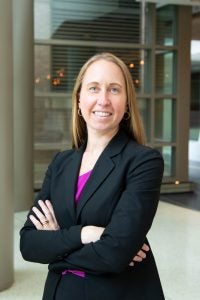 Sara Kaiser Creighton (L’10) arrived at Georgetown Law after studying health policy at Stanford, sure she was on track for a career in health care legislation. Her plans soon changed, she says with a laugh.
Sara Kaiser Creighton (L’10) arrived at Georgetown Law after studying health policy at Stanford, sure she was on track for a career in health care legislation. Her plans soon changed, she says with a laugh.
“I caught the litigation bug. The analytical puzzle of putting together the facts of a case with the law that exists really clicked with the way my brain works,” she says. “I did the appellate litigation clinic, which was amazing. I got to argue in the D.C. Circuit and file a cert petition in the Supreme Court as a student.”
She went on to clerk for Chief Judge Sharon Prost of the U.S. Court of Appeals for the Federal Circuit and for Judge Ellen Segal Huvelle of the U.S. District Court for the District of Columbia. She also worked as an associate at Williams & Connolly and eventually joined the staff of a new nonprofit litigation group, American Oversight.
Still, she kept thinking about her year as a Law Fellow, a Georgetown Law program in which upper class students who want to hone their legal writing skills are mentored by faculty members and in turn help teach the 1L Legal Practice course.
“I liked litigation. But I always had in the back of my head that I wanted to come back and teach Legal Practice at Georgetown, because being a law fellow had been the best experience I had in law school. Even back then, I thought, OK, how do I get Professor Cedrone’s job?” she says.
Now, she is a colleague of Michael Cedrone (L’03), chair of the Law Center’s Legal Practice program. Creighton first dipped her toe into teaching as an adjunct at American University’s Washington College of Law, then came to Georgetown on a one-year visiting contract a year ago before joining the faculty full time this summer.
“I’m really very lucky to be where I am,” she says of being back at her alma mater. “My colleagues welcomed me with open arms and offered me every possible resource I could ever need. The students really blew me away. And I have to say, working with Law Fellows was one of my favorite parts of the year.”
In addition to enjoying her new role introducing the next generation of Georgetown lawyers to the intricacies of legal writing, she also believes that by sharing her own story, she can encourage her students to keep an open mind about their futures.
“I hope that my career is some comfort to the students who come in feeling like they have to have it all figured out. Because first I was a pharmaceutical patent litigator, then I did government transparency litigation at a nonprofit. And now I’m teaching. This is effectively my third career already,” she says.
“One thing can lead to another in ways that don’t feel linear. Going through one open door doesn’t necessarily close the others.”
Associate Professor Amy J. Griffin
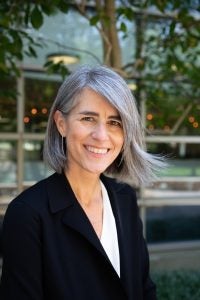 Amy Griffin chose to go to law school at Berkeley Law in order to experience a different part of the country after growing up in Massachusetts and graduating from Boston College. Reflecting on her student days in the Bay Area, she has two overarching thoughts.
Amy Griffin chose to go to law school at Berkeley Law in order to experience a different part of the country after growing up in Massachusetts and graduating from Boston College. Reflecting on her student days in the Bay Area, she has two overarching thoughts.
“The intellectual vibrancy of Berkeley was really striking to me. The energy that was there, its activist history, was inspiring,” she says. “And my other strong memory of law school is that I just had no idea what I was doing.
“That’s one of the reasons I’m passionate about teaching, because I can look back at myself and see that I really didn’t understand how to fix that problem, how to become a better learner. That still motivates me today.”
Following law school, she worked in commercial litigation at a firm in Denver – and enjoyed it – but several months after having her first child, decided to spend some time as a full-time parent.
Eight years later, when she was ready to reenter the workforce, her family was living in Indiana. An opening for a part-time position teaching legal writing at Notre Dame caught her eye.
“When I was in law school, there was no legal writing class. But I loved writing and that was my favorite part of practice as an associate,” she says. “Teaching hadn’t even crossed my mind when I saw the listing.
“I accidentally got into academia, and ended up loving it.”
Griffin stayed at Notre Dame for seven years, then taught legal writing for a decade at the University of Colorado Law School. She feels that Georgetown Law is the ideal place for the next stage of her teaching and scholarship.
“Georgetown has a national reputation for taking legal writing really seriously. It has an amazing community of professors, and I’m excited to join that group,” she says.
The Law Fellow program, in which advanced legal writing students help teach first-year writing courses, is also a draw for her.
“I think a lot about how people learn. Working with Law Fellows who’ve just been through the difficult transition to law school is going to be an interesting and extremely helpful new piece for me,” she says.
In addition to teaching legal writing, Griffin has continued to work on her own scholarship, which she feels helps her and her students relate to each other.
“I’m interested in the creative process of putting together complex legal arguments. A lot of my scholarship is about the choice of authority – the kinds of sources judges and lawyers use to put together complex legal arguments,” she says.
“Not only is that topic relevant to my course, I think it makes me a much better teacher to be someone who’s also struggling with writing. It’s never easy!”
Associate Professor Mark Jia
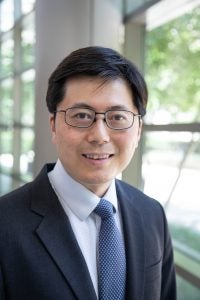 Mark Jia says he first fell in love with the law when he was an undergraduate at Princeton and took a course in American constitutional development.
Mark Jia says he first fell in love with the law when he was an undergraduate at Princeton and took a course in American constitutional development.
“The approach was less doctrinal, focusing more on the broader political and social forces shaping the law,” he recalls. “Doctrine is important, but it’s only a part of the story.”
Understanding how the U.S. constitution came to be made him curious about the development of other legal systems, which led him to study Chinese law while at Oxford University on a Rhodes scholarship.
He went on to Harvard Law and to two postgraduate clerkships: first with Judge William Fletcher at the U.S. Court of Appeals for the Ninth Circuit, then on the U.S. Supreme Court, where he worked with both retired Justice David Souter and Justice Ruth Bader Ginsburg.
Justice Ginsburg, in particular, was an inspiration in his ongoing explorations of comparative and transnational law. “She had significant foreign law interests. Her first major book was on the civil procedure of Sweden,” he says, adding, “She was incredibly fond of foreign travel, too, and of engaging with foreign legal systems.”
Jia next worked as an associate in a couple of law firms, but soon decided academic life was where his interests lay. Last year, he was a fellow and lecturer at his alma mater, Harvard Law School. Now, he is looking forward to continuing his teaching and scholarship at Georgetown Law.
“Georgetown is such a cosmopolitan place,” he says. “It’s quite a thrill to me that I now have a job where I can simultaneously pursue both of my interests in American law and Chinese law.”
He has already been published in several law journals – his article for the University of Pennsylvania Law Review, “Illiberal Law in American Courts,” was awarded the 2022 Mark Tushnet Prize by the AALS Section on Comparative Law.
He also is enjoying introducing students to his research interests. This year, he is teaching “Comparative Law: China in Context” and “Law and Authoritarianism.”
“When comparative law is taught well, you dispel a sense of false necessity, the notion that the way things are here are how they always must be,” he says. “There’s a big world out there, and all legal systems to some degree confront similar challenges. Over time, they’ve come up with a diverse array of approaches.
“Ultimately, I think the value of comparative law is to help us better understand our own legal system: how it came to be, and how we move it forward.”
Associate Professor Nicole Summers
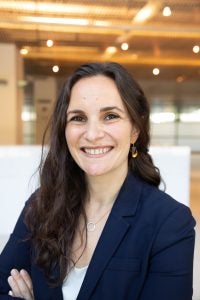 Like many 1Ls, Nicole Summers entered law school planning on a career related to social justice, but she wasn’t yet sure exactly what issue she wanted to take on.
Like many 1Ls, Nicole Summers entered law school planning on a career related to social justice, but she wasn’t yet sure exactly what issue she wanted to take on.
Hailing from a racially and socioeconomically diverse community (Evanston, Illinois), raised by a father who’d served in the Peace Corps and a mother with a career in social work, and having majored in Development Studies as an undergraduate at Brown, she was keenly conscious of the pervasive inequality in the U.S. and abroad.
“I wanted to do something to change the world,” she says. But where to begin?
During her first year at Harvard Law School, she wasn’t sure law was going to be the right field for her after all.
“I felt very detached from what I was learning and from the issues I cared about. I really wanted to find a way to get back to those original reasons for coming to law school,” she remembers.
Then she joined the Harvard Legal Aid Bureau, an intensive two-year clinical program, and discovered the issue that would become her cause: housing law.
“It was the height of the foreclosure crisis, and I saw the devastation it was wreaking on minority and low-income communities,” she says. “I also saw the power of law to do something for people. I represented a number of clients who were able to get their houses back after being foreclosed. It was transformative.”
After law school, she clerked for Chief Justice Ralph Gants of the Massachusetts Supreme Judicial Court, worked for a public defender nonprofit in the Bronx and was a fellow at a housing law and policy center at NYU. Then, she had the chance to return to her alma mater to help lead the clinic that had so shaped her.
“It was really rewarding to see students experience the same ‘a-ha moments’ that I experienced when I was a student and became passionate about issues of housing justice,” she says of her work at Harvard Law over the last four years.
At Georgetown, she’s pivoting to focus on the classroom, teaching Property and a seminar in housing law and policy. With rising rents and home prices in the headlines, students are increasingly interested in understanding the legal framework around housing in the U.S.
Even though Summers won’t be working in a clinic at this time, she appreciates the Law Center’s strong clinical program.
“I think clinical education is really core to a law school’s mission, so I wanted to be at a place that highly valued it,” she says. “Georgetown feels like an excellent fit for me. It really feels like people here value public interest and the practical world of law.”
Associate Professor Daniel Wilf-Townsend
Growing up as the son of two doctors, Daniel Wilf-Townsend enjoyed hearing stories about cases from the hospital, but he never imagined himself as a doctor. He was far more curious about how decisions get made when conflicts arise.
“My mom was on the bioethics committee, and would tell me about disagreements between patients, family members and doctors and how fraught those would be,” he says. “There are disputes in society that we have to resolve somehow. So that seemed like an interesting place to spend time thinking.”
After college and law school at Yale, he clerked for Judge Marsha Berzon on the U.S. Court of Appeals for the Ninth Circuit and for Judge Jeffrey Meyer on the U.S. District Court for the District of Connecticut.
Next came an associateship at the firm Gupta Wessler PLLC. He had always considered academia, but thought that private practice in the right place could be an exciting way to learn more about the law while working in the public interest.
Gupta Wessler, founded by Georgetown Law alum Deepak Gupta (L’02), is a smaller public interest firm that focuses on appellate litigation, and Wilf-Townsend says it was there that he was able to put what he’d learned in law school into context. Representing clients in consumer protection cases had him working on some of those societal disputes he’d been thinking about since childhood. And the outcomes of these cases could have larger implications.
“If you can win a precedential victory on a procedural issue, you’ll be able to help people in all different sorts of cases,” he says. “Ironically, I didn’t love Civil Procedure when I took it my 1L year. I hope, as a teacher, to transmit some of the enthusiasm I have around the issues that I found as a litigator.”
Wilf-Townsend will be teaching Civil Procedure to 1Ls this year, as well as a class on “Approaches to Consumer Protection.” He had his introduction to academia over the last two years as a lecturer and fellow at the University of Chicago Law School.
In addition to enjoying working with students, he’s also digging into research and writing, exploring ways to make the legal system more accessible to marginalized people when they become civil defendants in cases like evictions or debt collections.
“Teaching gives you an excuse to visit important issues every day,” he says. “And so many people come to Georgetown who are interested in using the law to make the world a better place. Getting to learn and work on legal issues in a city where people around you are all doing the same thing is an exciting place to be.”
Associate Professor Jonathon Zytnick
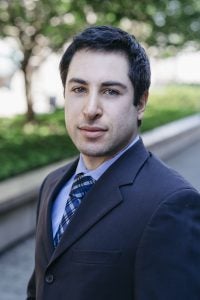 Jonathon Zytnick grew up just outside Washington, D.C., reading newspapers, discussing them with his family and becoming “a hardcore policy wonk.”
Jonathon Zytnick grew up just outside Washington, D.C., reading newspapers, discussing them with his family and becoming “a hardcore policy wonk.”
As a college student at the University of Maryland, he began to think about turning his interest into a career. “I had this strong feeling that you could slice through some of the ideological divisions if you could just do things better, with more competent, better-designed institutions,” he says.
After college came Yale Law School, a clerkship in the United States Court of Federal Claims and an associateship at Paul, Weiss.
“That’s where I really started thinking about academia,” he recalls of his time in private practice. “I was doing mergers and acquisitions and I kept asking questions like, ‘How does this merger create value?’ And the answer wouldn’t really make sense to me, so I looked for something where I could be a little bit more curious.”
His roommate at the time was getting a Ph.D. in economics and encouraged him to do so as well. “The pitch was: you’re trying to improve people’s welfare, but you use math and puzzles as a tool to figure out how,” he says. Zytnick followed suit and enrolled in graduate school at Columbia University.
He took a detour from his doctoral program to serve as commissioner’s counsel to his academic mentor, Robert J. Jackson, Jr., at the U.S. Securities and Exchange Commission. He hopes it won’t be his last policy role.
“One of the perks of being a professor is you can take some time off and walk into this other role, and they complement each other,” he says. “I love the fact that people go in and out of government.”
Zytnick is excited about the many opportunities Georgetown Law professors have to engage in policy work.
“Policymakers and regulators call up professors at Georgetown and say, ‘Walk me through this issue. How should I think about this?’ That’s the kind of real-world impact you’re always looking for when you’re producing research,” he says.
He has written for both academic and popular audiences. His NYU Law and Economics research paper “Do Mutual Funds Represent Individual Investors?” received the Investments & Wealth Institute’s 2022 Governance Insight Award. His first op-ed column, co-written with Yale Law School’s Yair Listokin on the ownership dispute between Elon Musk and Twitter, appeared this summer in the New York Times.
This year he’ll be teaching Corporations and a seminar on shareholder power, and he’s already looking forward to seeing what his students will contribute to the classroom experience.
“I’ve been a student a lot, but when I was a student, I never fully appreciated just how much students add to the class, or how much I could add to the class,” he says. “As a professor, no matter how much thought you’ve given a topic, the students are always going to bring new perspectives and change your mind about things.”
